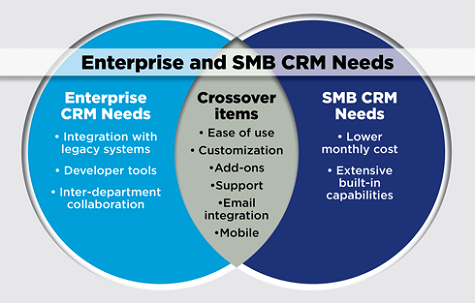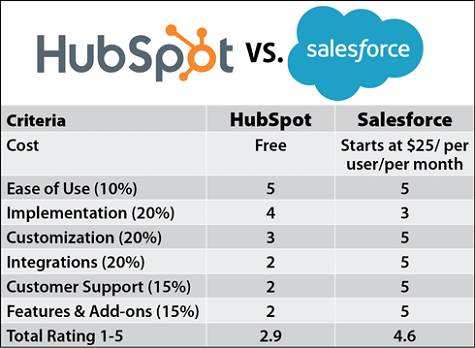When it comes to anything that is free, there’s a natural tendency to assume some key feature has been hobbled or is missing altogether. In the case of the free CRM application offered by HubSpot, it turns out that the number of limitations is surprisingly few. HubSpot CRM may not meet the needs of a large-scale enterprise trying to support a complex portfolio of products sold through multiple channels in the way Salesforce does. But for the average small-to-medium business (SMB), the HubSpot CRM may be the best CRM software option.
HubSpot and Salesforce have pursued very different CRM paths. Salesforce helped pioneer the adoption of CRM software-as-a-service (SaaS) applications by initially focusing on the needs of salespeople working in SMB organizations. Salesforce still pursues that market. But over time, Salesforce considerably expanded its focus on the needs of large-scale enterprise organizations.

Hubspot
HubSpot made its name by providing automation tools for optimizing marketing campaigns. Marketers almost invariably required access to a CRM application to effectively manage those campaigns, a requirement that HubSpot decided to meet by offering a free CRM application that would encourage markets to adopt the rest of its portfolio. Since then, the HubSpot CRM has gained traction both inside and out of marketing departments.
Salesforce
Salesforce has also expanded its reach beyond the sales team to include a variety of marketing automation tools it makes available as a complementary set of SaaS applications. Most of those tools have been acquired over the last several years. In addition to appealing to marketers who need to work more closely with sales teams that have standardized on the Salesforce CRM platform, the Salesforce approach also appeals to sales teams that want to exercise more control over how sales leads are generated within an organization’s base of known existing and potential customers.
It’s not likely that a free instance of HubSpot CRM represents an existential threat to Salesforce. But it may very well serve to limit the appeal of Salesforce among SMB organizations that may find a free instance of HubSpot CRM easily meets all their core requirements.
What are the Similarities & Differences between HubSpot and Salesforce?

Cost
HubSpot Costs
HubSpot’s free version is truly free. Starter level starts at $50/month, Professional at $400/month, and Enterprise at $1200/month.
Salesforce Costs
Small Business Essentials is $25/user/month (billed annually), Lightning Professional $75/user/month, and Lightning Enterprise $150/user/month.
It’s hard to beat free, but organizations that adopt HubSpot CRM should be aware that there are fees for integrating HubSpot CRM with the company’s core marketing automation platform. At the same time, organizations should be aware that Salesforce requires organizations to commit to a specific number of user licenses per year, which is not a truly consumption-based pricing model.
Ease of Use
In terms of base-level requirements for a CRM application, both platforms are adequate. But as the complexity of the sales process increases, many of the more sophisticated nuances provided within the Salesforce application start to shine.
Implementation
Most organizations are going to find HubSpot CRM easier to implement, but neither offering works out of the “proverbial” box. Each platform requires a significant amount of data management effort to get up and running. Most organizations wind up relying on professional consultants to get their Salesforce CRM instance up and running.
Customization
As a free application, the ability to customize HubSpot CRM is, not surprisingly, limited. In contrast, Salesforce provides a wide range of customizations tools both within the core SaaS applications as well as via a robust low-code application development environment dubbed Salesforce Lightning.
Integrations
The integration tools provided by HubSpot are primarily focused on the company’s core marketing automation platform, through which it generates just about all its revenue. Salesforce provides a rich set of integration tools both with the core SaaS application as well as via the MuleSoft integration platform that Salesforce acquired last year.
Customer Support
Support for the free edition of HubSpot CRM is, not surprisingly, limited. But organizations that pay commercial fees for the HubSpot marketing automation platform do gain access to HubSpot CRM support. Support for Salesforce CRM deployments is among the most extensive for any SaaS application.
Features & Add-ons
HubSpot CRM may be free, but what add-ons there are available come at a nominal cost. Salesforce, in contrast, has one of the richest app stores in the cloud. But each add-on can wind up driving up the total cost of the application environment considerably.
Related CRM Comparison Articles
How to decide which is Best for Your Situation
The decision to go with HubSpot CRM versus Salesforce CRM is clearly influenced by cost. A free CRM application that is capable of handling 80 percent of the most common tasks is hard to ignore, especially if that CRM application needs to be tied specifically to the marketing automation platform provided by HubSpot.
But there are already many salespeople who are intimately familiar with the Salesforce CRM platform. In fact, access to Salesforce can play a major factor in being able to hire the best sales management talent.
Our Recommendation for Small Businesses
HubSpot CRM offers the combination of attractive cost range, including a free version, and ease of use that best suits small businesses and SMBs.
Our Recommendation for Startups
HubSpot CRM best offers the flexibility that startups require to accommodate growth.
Our Recommendation for Real Estate
Real estate-related organizations that have an experienced, self-starting staff will enjoy a faster ramp-up toward increased efficiency with Salesforce CRM.
The simple fact of the matter is that while there are significant differences in terms of capability and the level of support provided, no organization can be faulted for at least initially deciding to make the most of a free CRM application.










